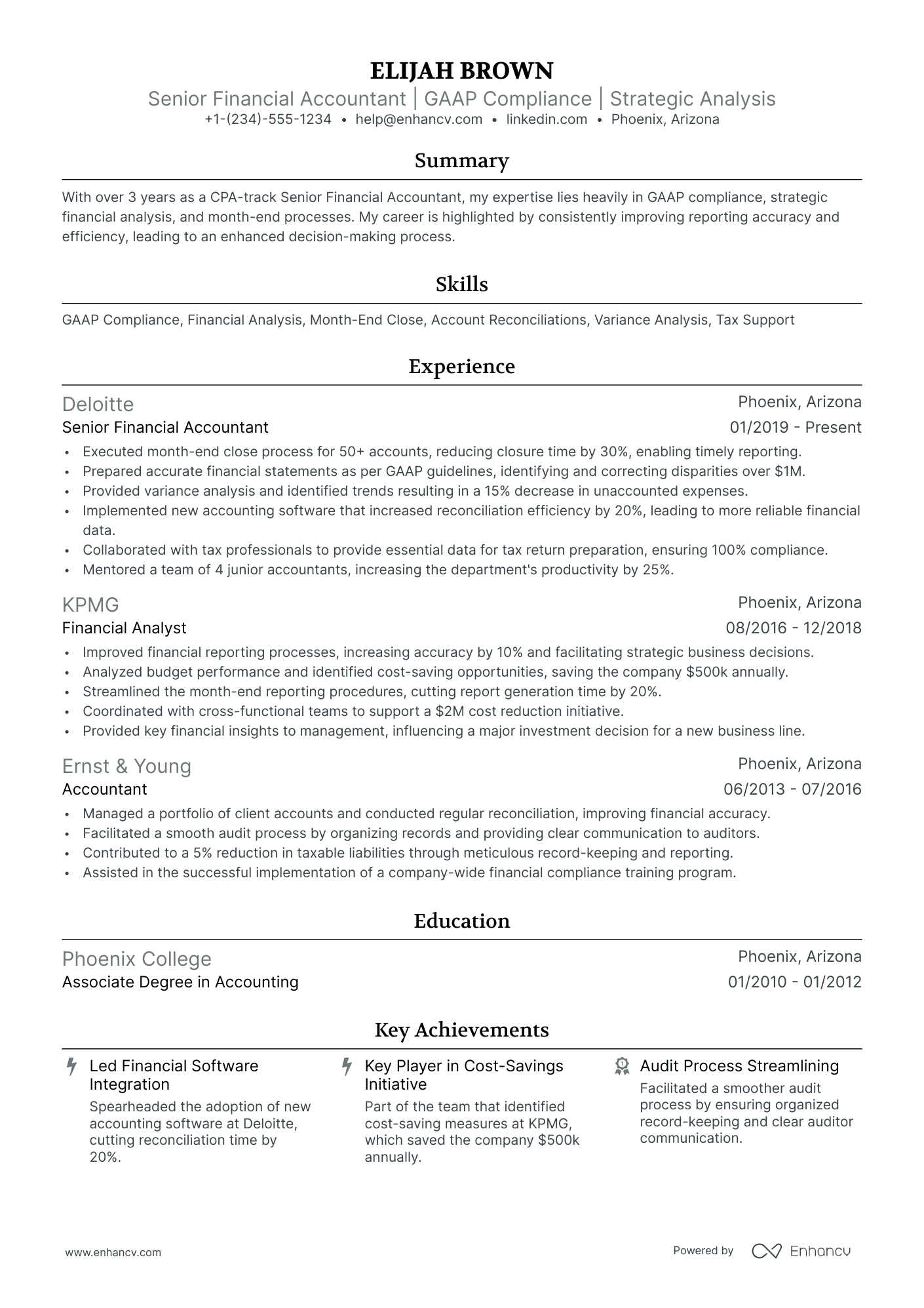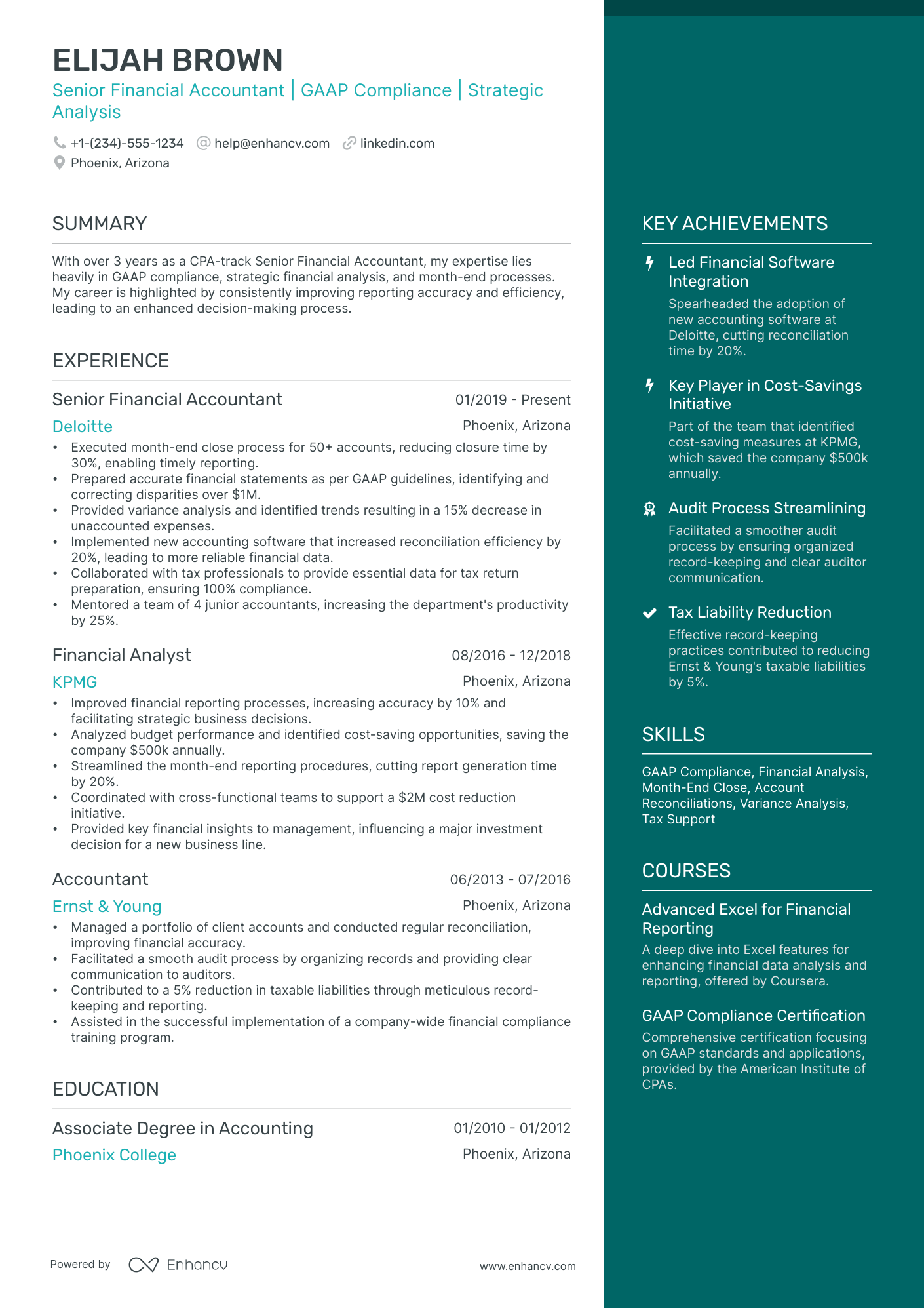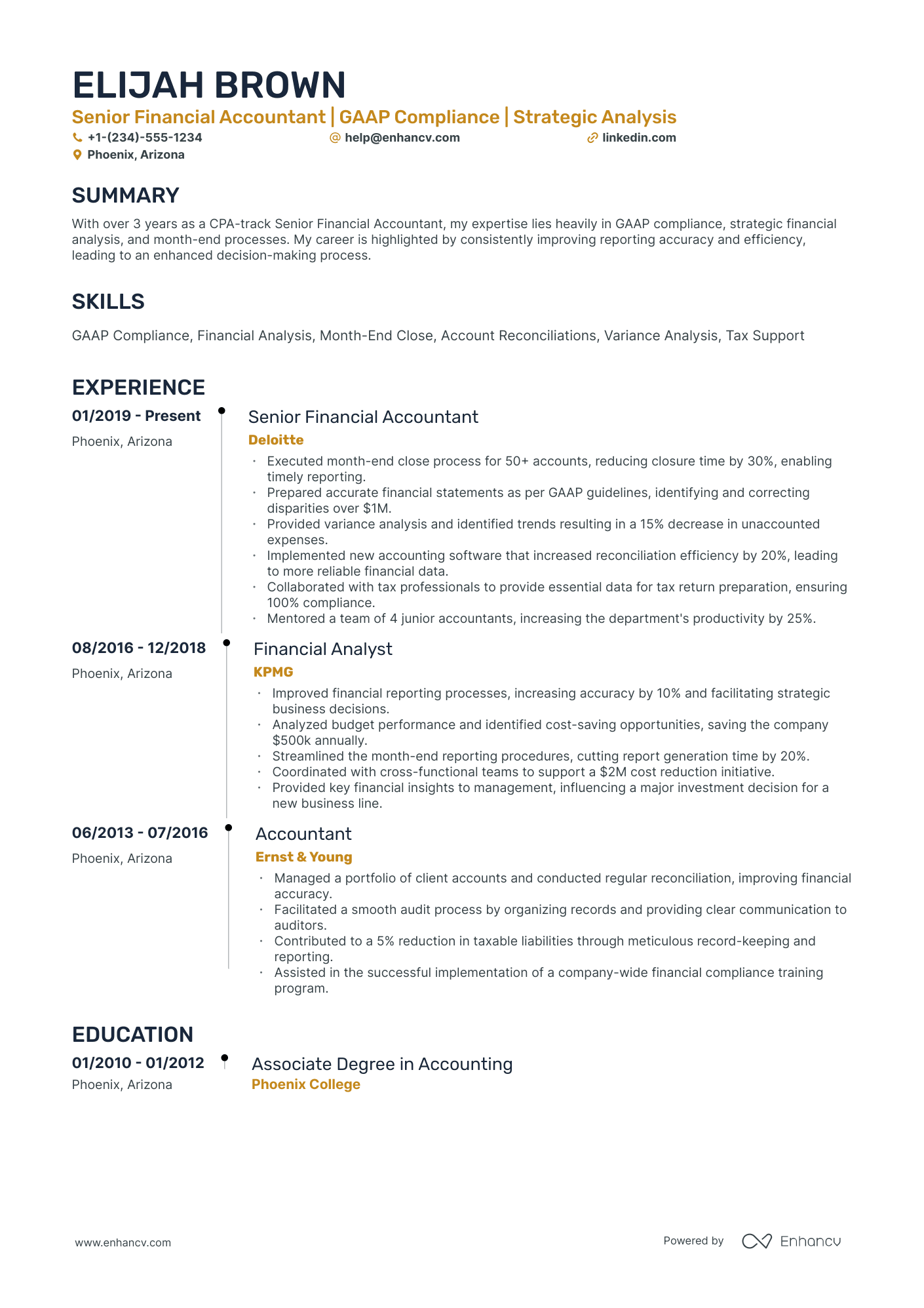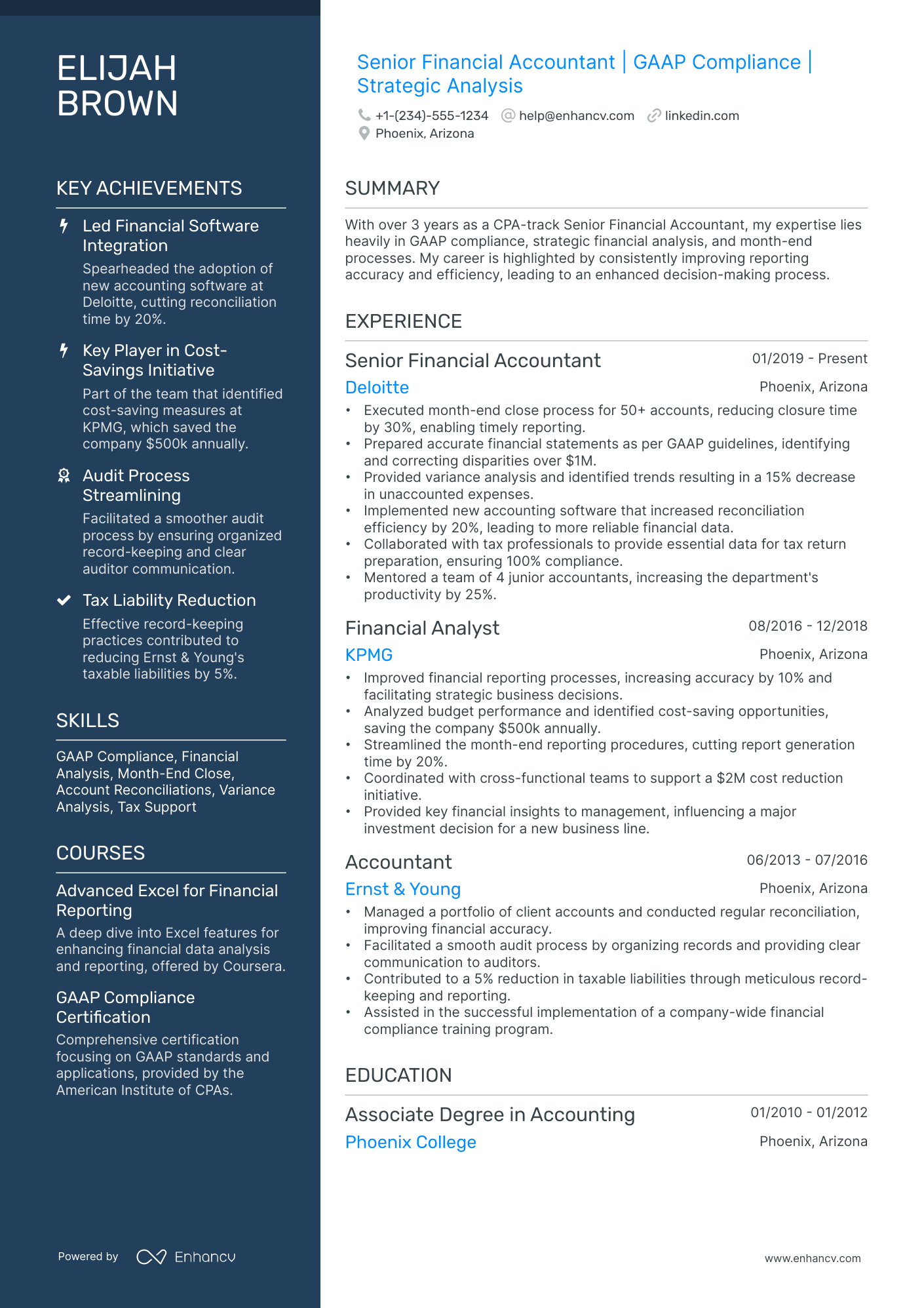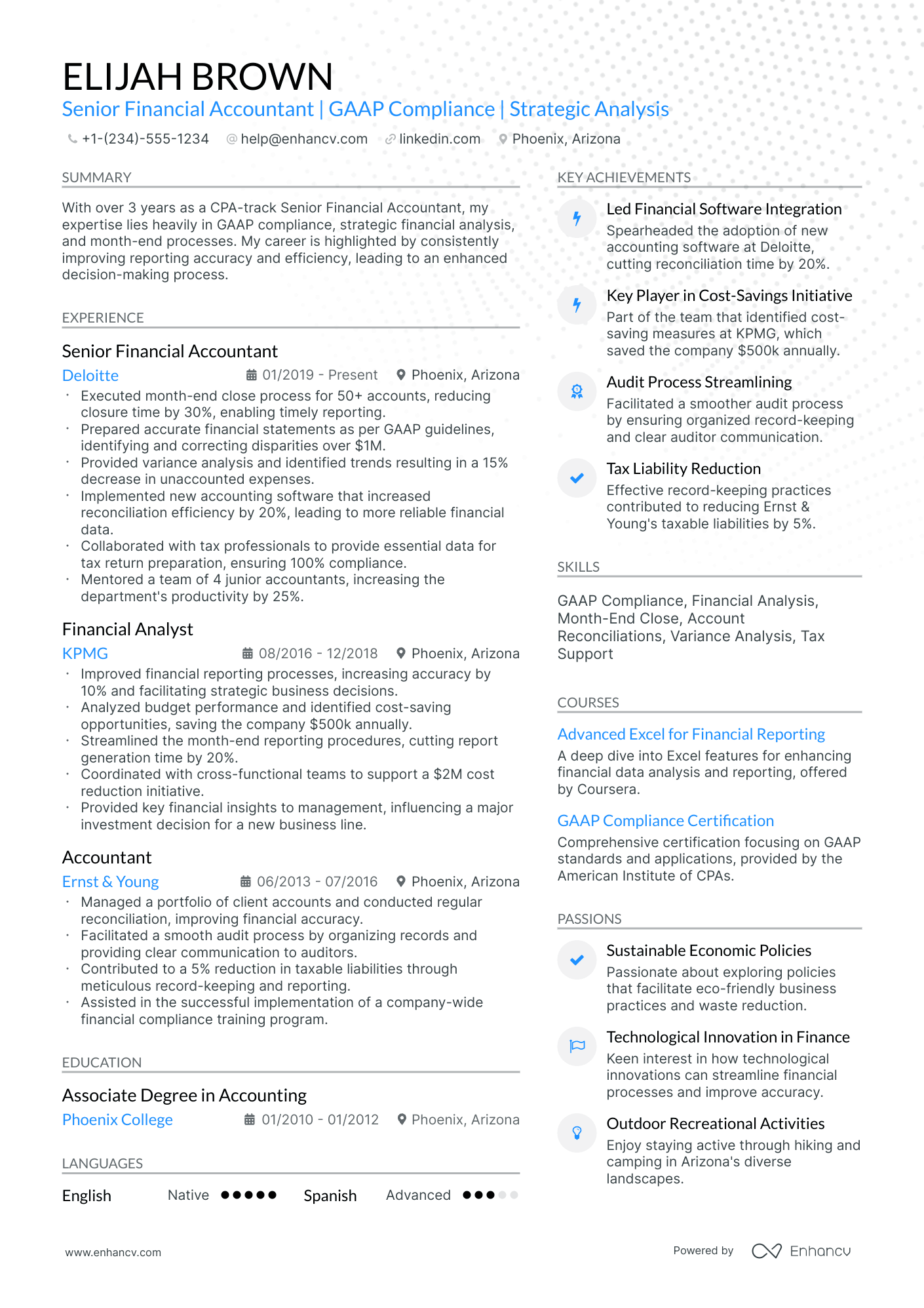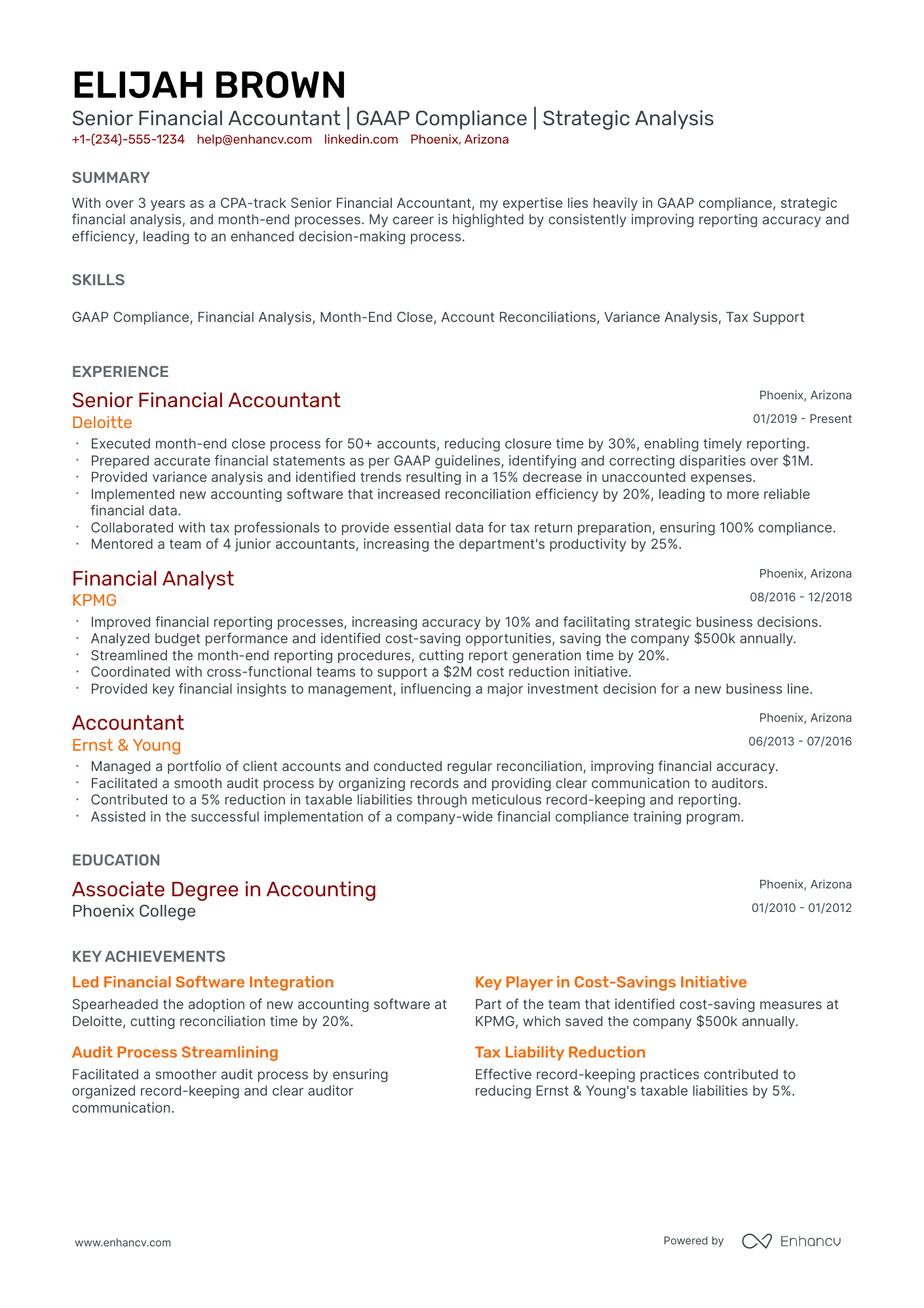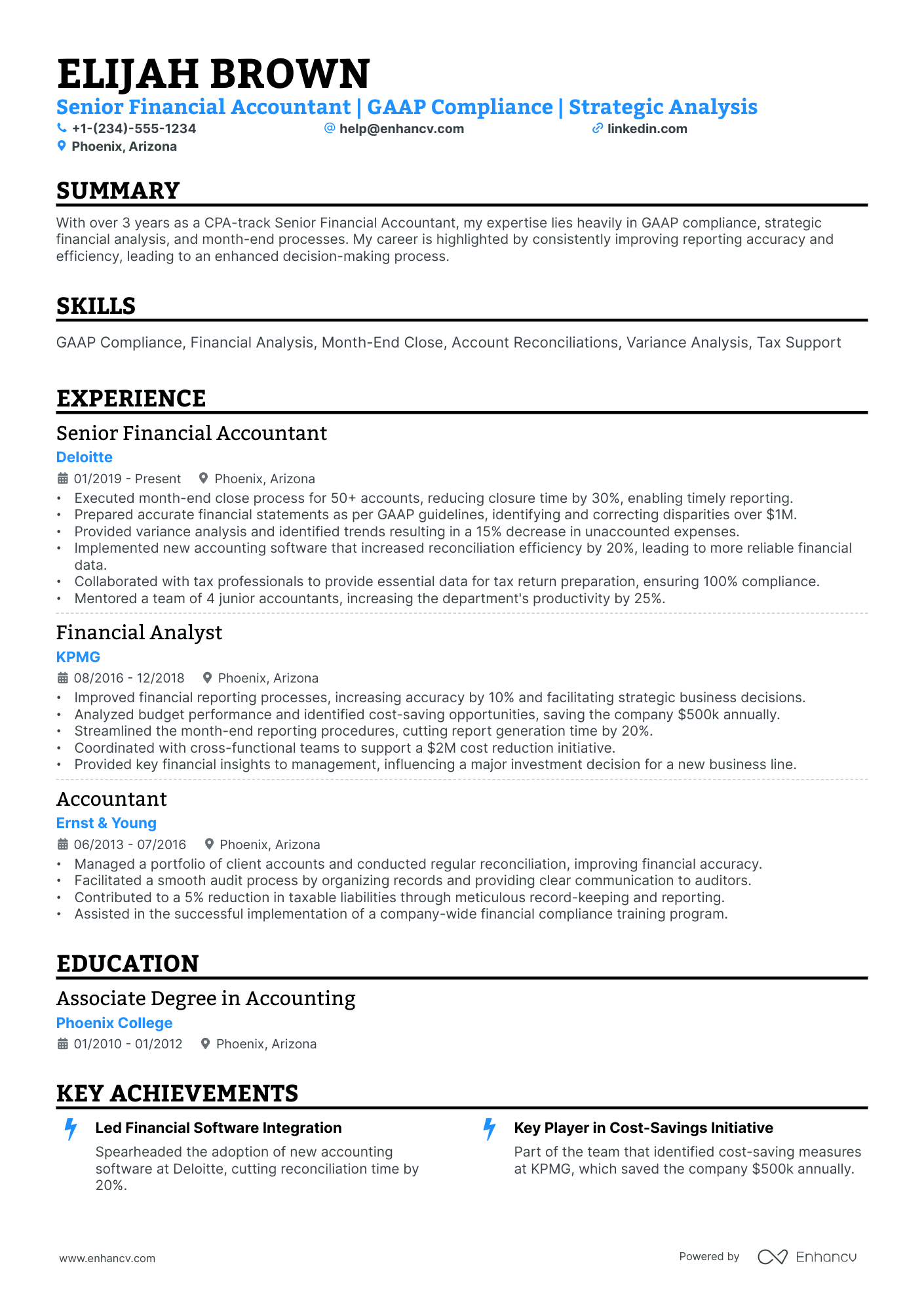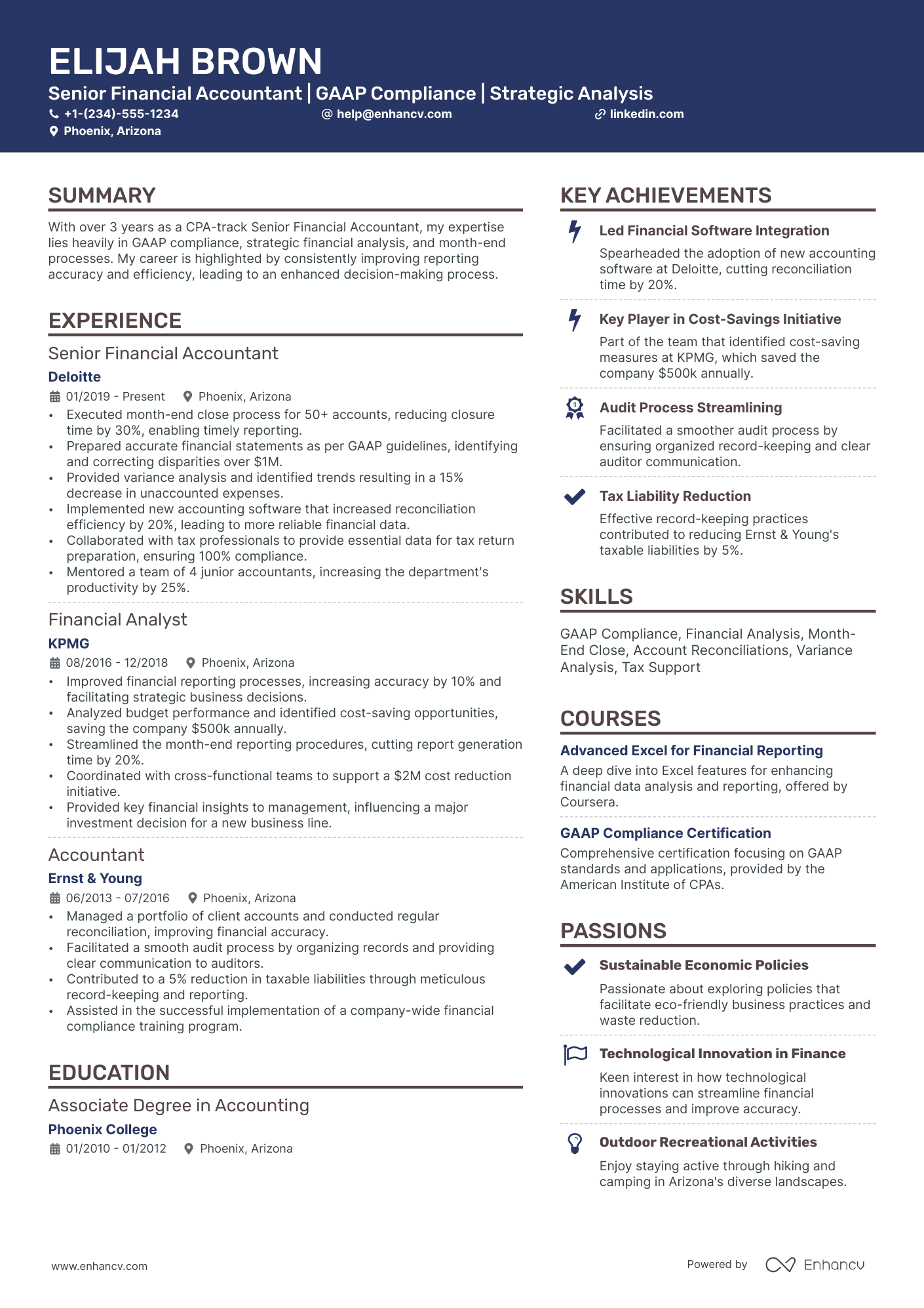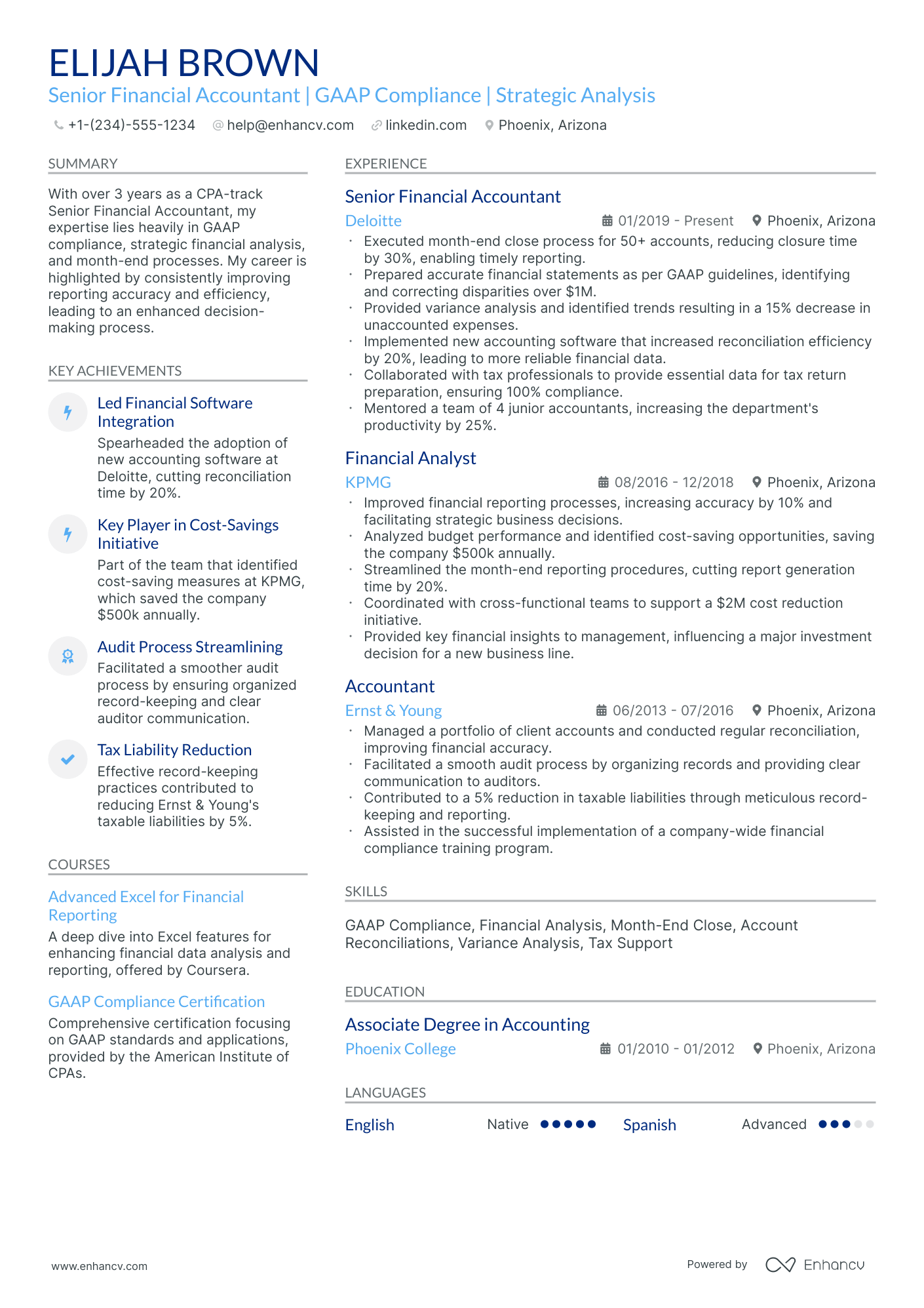Many financial accounting resume submissions fail because they read like task lists and bury the evidence of accuracy, controls, and impact. That makes them easy for an ATS (applicant tracking system) to mis-rank and for recruiters to skip in fast, competitive screens.
A strong resume shows how you improved outcomes, not just what you used. Highlight faster month-end close, fewer audit findings, cleaner reconciliations, reduced variances, stronger cash flow forecasting, and better compliance across entities or business units. If you're unsure where to begin, learning how to write a resume that emphasizes results over duties is the essential first step.
Key takeaways
- Quantify outcomes like close-cycle time, audit findings, and cost savings in every experience bullet.
- Use reverse-chronological format for experienced accountants and hybrid format for career changers.
- Tailor each resume to mirror the job posting's exact tools, standards, and terminology.
- Place certifications like CPA or CMA near your education section to signal credibility fast.
- Anchor every listed skill to a measurable result in your summary or experience section.
- Use Enhancv to turn vague job duties into specific, recruiter-ready bullet points.
- Stop using AI once your resume accurately reflects real experience without inflated claims.
Job market snapshot for financial accountings
We analyzed 304 recent financial accounting job ads across major US job boards. These numbers help you understand industry demand, employment type trends, skills in demand at a glance.
What level of experience employers are looking for financial accountings
| Years of Experience | Percentage found in job ads |
|---|---|
| 1–2 years | 18.1% (55) |
| 3–4 years | 27.3% (83) |
| 5–6 years | 30.9% (94) |
| 7–8 years | 4.9% (15) |
| 9–10 years | 0.7% (2) |
| 10+ years | 1.3% (4) |
| Not specified | 17.1% (52) |
Financial accounting ads by area of specialization (industry)
| Industry (Area) | Percentage found in job ads |
|---|---|
| Finance & Banking | 78.3% (238) |
| Healthcare | 16.1% (49) |
Top companies hiring financial accountings
| Company | Percentage found in job ads |
|---|---|
| Accenture | 53.9% (164) |
| Elevance Health | 15.1% (46) |
Role overview stats
These tables show the most common responsibilities and employment types for financial accounting roles. Use them to align your resume with what employers expect and to understand how the role is structured across the market.
Day-to-day activities and top responsibilities for a financial accounting
| Responsibility | Percentage found in job ads |
|---|---|
| General ledger | 34.5% (105) |
| Financial accounting hub | 28.9% (88) |
| Oracle cloud financial management | 28.9% (88) |
| Record to report | 28.9% (88) |
| Oracle cloud epm | 27.3% (83) |
| Oracle methodologies | 27.3% (83) |
| Workday | 25.7% (78) |
| Oracle cloud | 25.3% (77) |
| Accounting | 25.0% (76) |
| Sap | 17.4% (53) |
| Netsuite | 14.5% (44) |
| Peoplesoft | 14.5% (44) |
Type of employment (remote vs on-site vs hybrid)
| Employment type | Percentage found in job ads |
|---|---|
| On-site | 71.1% (216) |
| Hybrid | 25.7% (78) |
| Remote | 3.3% (10) |
How to format a financial accounting resume
Recruiters evaluating financial accounting resumes prioritize accuracy in financial reporting, regulatory compliance knowledge, and proficiency with accounting software such as QuickBooks, SAP, or Oracle. A clean reverse-chronological format ensures these signals surface quickly, letting hiring managers trace your progression through increasingly complex accounting responsibilities without friction. Choosing the right resume format from the start prevents your strongest qualifications from getting buried.
I have significant experience in this role—which format should I use?
Use the reverse-chronological format—it's the strongest choice for showcasing a steady track record in financial accounting. Do:
- Lead each role entry with your scope of ownership: portfolio size, number of entities managed, reporting lines, and compliance jurisdictions.
- Highlight domain-specific tools and competencies such as GAAP/IFRS compliance, ERP platforms, general ledger management, and month-end close processes.
- Quantify outcomes tied to business impact—cost savings from process improvements, audit findings reduced, or close-cycle time shortened.
I'm junior or switching into this role—what format works best?
A hybrid format works best, letting you lead with core accounting skills while still presenting your experience in chronological order. Do:
- Place a focused skills section near the top featuring technical proficiencies like accounts reconciliation, journal entries, tax filings, and relevant software certifications.
- Include academic projects, internships, or transitional roles that demonstrate hands-on accounting work—even if they weren't full-time positions.
- Connect every listed skill to a concrete action and a measurable result so recruiters see application, not just knowledge.
Why not use a functional resume?
A functional format strips away the timeline recruiters need to evaluate how your accounting knowledge developed, making it harder to verify progressive responsibility and consistent accuracy in financial reporting.
- A functional resume may be acceptable if you're transitioning into financial accounting from a related field like bookkeeping or auditing, have a gap in employment history, or lack formal accounting roles—but only if every listed skill is anchored to a specific project, coursework, or freelance engagement with a measurable outcome.
Once your resume's format establishes a clean, readable structure, the next step is filling it with the right sections to showcase your qualifications effectively.
What sections should go on a financial accounting resume
Recruiters expect you to present your accounting expertise, reporting responsibilities, and measurable results in a clean, standard resume format. Knowing what to put on a resume for financial accounting roles ensures you don't leave out critical sections or clutter the page with irrelevant details. Use this structure for maximum clarity:
- Header
- Summary
- Experience
- Skills
- Projects
- Education
- Certifications
- Optional sections: Awards, Leadership, Languages
Your experience bullets should emphasize financial impact, audit readiness, reporting accuracy, process improvements, and the scope of accounts, entities, or systems you supported.
Is your resume good enough?
Drop your resume here or choose a file. PDF & DOCX only. Max 2MB file size.
Once you’ve organized your resume with the right core components, the next step is to write your financial accounting resume experience section in a way that fits that structure and supports your application.
How to write your financial accounting resume experience
Your work experience section should demonstrate the financial accounting work you've actually delivered—audits completed, reports produced, reconciliations managed—using the specific tools, standards, and methods that define the role. Hiring managers prioritize demonstrated impact over descriptive task lists, so every bullet should connect your responsibilities to measurable outcomes like reduced discrepancies, faster close cycles, or improved compliance.
Each entry should include:
- Job title
- Company and location (or remote)
- Dates of employment (month and year)
Three to five concise bullet points showing what you owned, how you executed, and what outcomes you delivered:
- Ownership scope: the financial statements, ledgers, account portfolios, reporting cycles, or compliance areas you were directly accountable for.
- Execution approach: the accounting software, ERP systems, GAAP or IFRS frameworks, reconciliation methods, or analytical techniques you used to complete your work and inform decisions.
- Value improved: changes to reporting accuracy, close timelines, audit readiness, regulatory compliance, error rates, or internal controls that resulted from your efforts.
- Collaboration context: how you partnered with auditors, tax teams, controllers, department heads, or external regulators to align financial data with organizational and legal requirements.
- Impact delivered: outcomes framed as tangible results—such as reductions in variance, improvements in timeliness, or strengthened financial integrity—rather than a list of recurring tasks.
Experience bullet formula
A financial accounting experience example
✅ Right example - modern, quantified, specific.
Senior Financial Accountant
Northbridge HealthTech | Austin, TX
2022–Present
High-growth healthcare software company serving multi-entity clients across the US.
- Led month-end close in NetSuite and BlackLine, cutting close cycle from eight to five business days while improving on-time reconciliations to 99%.
- Built and maintained revenue recognition workflows under ASC 606 using NetSuite Advanced Revenue Management and Excel Power Query, reducing manual journal entries by 35% and lowering audit adjustments by 60%.
- Partnered with FP&A and data engineering to automate variance reporting in Power BI from the general ledger and Snowflake, saving ten hours per month and improving forecast-to-actual accuracy by 4%.
- Implemented SOX-ready controls for journal entry approvals and account reconciliations in BlackLine and Jira, reducing control exceptions from nine to two per quarter.
- Coordinated with external auditors and tax advisors to deliver PBC schedules, tie-outs, and rollforwards, shortening audit fieldwork by 20% and avoiding late-filing penalties.
Now that you've seen how a strong experience section comes together, let's look at how to adjust yours based on the specific role you're targeting.
How to tailor your financial accounting resume experience
Recruiters evaluate your financial accounting resume through applicant tracking systems and manual review, scanning for alignment between your experience and the job posting. Tailoring your resume to the job description by reflecting the specific language and priorities in the listing increases your chances of passing both filters.
Ways to tailor your financial accounting experience:
- Match the exact ERP or accounting software named in the job description.
- Mirror the reporting standards mentioned such as GAAP or IFRS.
- Use the same terminology for reconciliation or close processes listed.
- Reflect specific KPIs or financial metrics the employer prioritizes.
- Highlight industry experience that aligns with the company's sector.
- Emphasize compliance or audit responsibilities when the posting requires them.
- Reference cross-functional collaboration if the role involves department partnerships.
- Include relevant regulatory or tax framework knowledge the listing specifies.
Tailoring means aligning your real accomplishments with what the employer asks for, not forcing disconnected keywords into your experience section.
Resume tailoring examples for financial accounting
| Job description excerpt | Untailored | Tailored |
|---|---|---|
| Perform monthly close processes, including journal entries, accruals, and reconciliations using Oracle ERP. | Helped with month-end tasks and general ledger activities. | Executed monthly close within five business days, posting 200+ journal entries, accruals, and balance sheet reconciliations in Oracle ERP with 99.5% accuracy. |
| Prepare financial statements in compliance with GAAP and support external audit requirements. | Prepared reports and assisted with audits as needed. | Prepared GAAP-compliant income statements, balance sheets, and cash flow statements quarterly and served as the primary liaison during annual external audits, reducing auditor inquiries by 30%. |
| Analyze budget-to-actual variances and present findings to senior leadership using SAP and Excel. | Reviewed budgets and created spreadsheets for management. | Analyzed monthly budget-to-actual variances across 12 cost centers in SAP, built dynamic Excel models to isolate spending trends, and presented actionable findings to the CFO and department directors. |
Once you’ve aligned your experience with the role’s requirements, quantify your financial accounting achievements to show the impact of that work.
How to quantify your financial accounting achievements
Quantifying your achievements proves business impact beyond job duties. Focus on close speed, accuracy, audit outcomes, compliance, cost savings, and risk reduction across the general ledger, reconciliations, and reporting.
Quantifying examples for financial accounting
| Metric | Example |
|---|---|
| Close cycle time | "Cut month-end close from seven to five business days by standardizing journal entry templates and automating reconciliations in NetSuite." |
| Reconciliation accuracy | "Reduced unreconciled items by 60% and kept bank and balance sheet reconciliations at 99.5% accuracy using BlackLine rules and variance thresholds." |
| Audit readiness | "Delivered a clean audit with zero material weaknesses by building a PBC tracker, tightening support, and responding to 120 requests within two days." |
| Compliance risk | "Lowered sales tax filing risk by eliminating late submissions from eight per quarter to zero using Avalara calendars and approval workflows." |
| Cost savings | "Saved $85,000 annually by renegotiating bank fees and reducing wire errors by 40% through dual-approval controls and vendor master cleanup." |
Turn vague job duties into measurable, recruiter-ready resume bullets in seconds with Enhancv's Bullet Point Generator.
Once you've crafted strong bullet points for your experience section, you'll want to apply that same precision to presenting your hard and soft skills.
How to list your hard and soft skills on a financial accounting resume
Your skills section shows you can close the books accurately and on time, and recruiters and applicant tracking systems scan it for role-specific keywords, so aim for a balanced mix of hard skills and job-relevant soft skills. financial accounting roles require a blend of:
- Product strategy and discovery skills.
- Data, analytics, and experimentation skills.
- Delivery, execution, and go-to-market discipline.
- Soft skills.
Your skills section should be:
- Scannable (bullet-style grouping).
- Relevant to the job post.
- Backed by proof in experience bullets.
- Updated with current tools.
Place your skills section:
- Above experience if you're junior or switching careers.
- Below experience if you're mid/senior with strong achievements.
Hard skills
- Month-end close
- General ledger accounting
- Journal entries, accruals
- Account reconciliations
- Financial statement preparation
- Variance analysis
- Revenue recognition (ASC 606)
- Lease accounting (ASC 842)
- Fixed assets, depreciation
- GAAP compliance
- Microsoft Excel, Power Query
- NetSuite, SAP, Oracle Financials
Soft skills
- Own the close calendar
- Communicate close status clearly
- Resolve reconciliation breaks fast
- Partner with FP&A on drivers
- Align with auditors on requests
- Document processes and controls
- Prioritize high-risk accounts
- Flag issues with solutions
- Coordinate cross-team dependencies
- Maintain confidentiality and judgment
- Challenge assumptions with data
- Follow through on deadlines
How to show your financial accounting skills in context
Skills shouldn't live only in a bulleted list on your resume. Explore resume skills examples to see how top candidates weave competencies into every section.
They should be demonstrated in:
- Your summary (high-level professional identity)
- Your experience (proof through outcomes)
Here's what strong financial accounting entries look like in practice.
Summary example
Senior financial accountant with 10+ years in manufacturing, skilled in GAAP compliance, SAP, and month-end close optimization. Led a reporting overhaul that cut close cycles by three days, improving forecast accuracy by 18%.
- Reflects senior-level expertise immediately
- Names specific tools like SAP
- Quantifies impact with clear metrics
- Signals leadership and collaboration
Experience example
Senior Financial Accountant
Creston Industrial Group | Milwaukee, WI
March 2018–Present
- Streamlined month-end close using SAP and advanced Excel, reducing cycle time from eight days to five across three business units.
- Partnered with FP&A and operations teams to redesign budget variance reports, improving departmental forecast accuracy by 22%.
- Led GAAP compliance audits for $120M in annual revenue, resolving 100% of findings before external review deadlines.
- Every bullet includes measurable proof
- Skills surface naturally through outcomes
Once you’ve demonstrated your accounting abilities through relevant coursework, projects, and results, the next step is to translate that evidence into a resume format that works even when you don’t have formal experience.
How do I write a financial accounting resume with no experience
Even without full-time experience, you can demonstrate readiness through:
- Financial accounting course capstone project
- Student-run business bookkeeping role
- Volunteer nonprofit month-end close support
- Internship in accounts payable processing
- Accounting software certification labs
- Case competitions with financial statements
- Audit simulation with working papers
- Personal ledger and reconciliation project
If you're in this situation, our guide on building a resume without work experience walks you through how to position these alternatives effectively.
Focus on:
- Accurate journal entries and reconciliations
- Financial statements and disclosures exposure
- Accounting software and spreadsheet outputs
- Controls, documentation, and traceability
Resume format tip for entry-level financial accounting
Use a skills-based resume format because it highlights financial accounting projects, coursework, and tools before limited work history. Do:
- Lead with financial accounting projects section.
- List coursework tied to deliverables.
- Quantify outputs: entries, accounts, variances.
- Name tools used: Excel, QuickBooks.
- Add links to sanitized work samples.
- Built a month-end close package in Excel and QuickBooks, posting sixty journal entries and reconciling eight accounts, cutting unreconciled variance by twelve percent.
Since your education often serves as your strongest qualification when you lack professional experience, presenting it effectively on your resume becomes essential.
How to list your education on a financial accounting resume
Your education section lets hiring teams confirm you have the foundational knowledge financial accounting roles demand. It validates your academic training in core principles like GAAP, auditing, and financial reporting.
Include:
- Degree name
- Institution
- Location
- Graduation year
- Relevant coursework (for juniors or entry-level candidates)
- Honors & GPA (if 3.5 or higher)
Skip month and day details—list the graduation year only.
Here's a strong education entry tailored to a financial accounting resume:
Example education entry
Bachelor of Science in Accounting
Indiana University, Kelley School of Business, Bloomington, IN
Graduated 2022
GPA: 3.7/4.0
- Relevant Coursework: Intermediate Financial Accounting, Auditing & Assurance Services, Cost Accounting, Federal Taxation, Financial Statement Analysis
- Honors: Magna Cum Laude, Beta Alpha Psi Honor Society
How to list your certifications on a financial accounting resume
Certifications on your resume show your commitment to learning, your proficiency with financial accounting tools, and your relevance to current industry standards in financial accounting.
Include:
- Certificate name
- Issuing organization
- Year
- Optional: credential ID or URL
- Place certifications below education when they're older, less relevant, or you have a strong, recent degree in financial accounting.
- Place certifications above education when they're recent, highly relevant, or required for your target financial accounting role.
Best certifications for your financial accounting resume
Certified Public Accountant (CPA) Chartered Financial Analyst (CFA) Certified Management Accountant (CMA) Certified Internal Auditor (CIA) Certified Fraud Examiner (CFE) Certified Information Systems Auditor (CISA) QuickBooks Certified User
Once you’ve positioned your credentials where they add the most value, you can write your financial accounting resume summary to highlight them upfront and set context for the rest of your experience.
How to write your financial accounting resume summary
Your resume summary is the first thing a recruiter reads. A strong one instantly connects your skills and experience to the financial accounting role.
Keep it to three to four lines, with:
- Your title and total years of experience in financial accounting.
- The domain or industry you've worked in, such as public accounting or corporate finance.
- Core tools and skills like GAAP, SAP, Excel, or financial reporting.
- One or two quantified achievements that demonstrate your impact.
- Soft skills tied to real outcomes, such as cross-team collaboration that improved close timelines.
PRO TIP
At the entry level, emphasize your technical skills, relevant coursework, and any early contributions during internships or first roles. Highlight proficiency in specific tools and your ability to learn fast. Avoid vague phrases like "passionate team player" or "motivated self-starter." Recruiters want to see what you can do, not how you describe yourself.
Example summary for a financial accounting
Detail-oriented financial accountant with two years of experience in month-end close and GAAP reporting. Reduced reconciliation errors by 18% using advanced Excel workflows across three business units.
Optimize your resume summary and objective for ATS
Drop your resume here or choose a file.
PDF & DOCX only. Max 2MB file size.
Now that your summary captures your strongest qualifications, make sure recruiters can actually reach you by setting up a clear, complete header.
What to include in a financial accounting resume header
A resume header lists your key contact and professional details, which boosts visibility, builds credibility, and speeds recruiter screening for financial accounting roles.
Essential resume header elements
- Full name
- Tailored job title and headline
- Location
- Phone number
- Professional email
- GitHub link
- Portfolio link
A LinkedIn link helps recruiters confirm titles, dates, and employers fast, which supports screening.
Don't include a photo on a financial accounting resume unless the role is explicitly front-facing or appearance-dependent.
Keep your header consistent with your financial accounting target role by mirroring the job title and using professional, searchable links.
Financial accounting resume header
Jordan Lee
Financial accountant | Financial accounting reporting and month-end close
Chicago, IL
(312) 555-01XX
your.name@enhancv.com
github.com/yourname
yourwebsite.com
linkedin.com/in/yourname
Once you’ve established a clear identity and contact details at the top of your resume, add targeted additional sections to strengthen your financial accounting qualifications and support the experience that follows.
Additional sections for financial accounting resumes
When your core qualifications match other candidates, well-chosen additional sections can set your financial accounting resume apart from the competition.
Consider adding these sections if they strengthen your candidacy:
- Languages
- Professional affiliations (e.g., AICPA, IMA)
- Continuing education and professional development
- Publications or industry presentations
- Volunteer work (especially pro bono accounting or nonprofit board service)
- Awards and honors
- Software proficiencies and technical tools
Once you've strengthened your resume with relevant additional sections, the next step is pairing it with a cover letter that adds even more context to your qualifications.
Do financial accounting resumes need a cover letter
A cover letter isn't required for most financial accounting roles, but it helps when the role is competitive or the hiring manager expects one. If you're unsure what a cover letter is and when it adds value, it's worth understanding before you decide to skip one. It can make a difference when your resume needs context or your fit isn't obvious.
Use a cover letter to add information your resume can't show:
- Explain role or team fit: Connect your experience to the team's scope, close cadence, reporting standards, and cross-functional partners.
- Highlight one or two relevant projects or outcomes: Quantify impact, such as shortening close time, reducing reconciliations, or improving audit readiness.
- Show understanding of the product, users, or business context: Tie your work to revenue streams, cost drivers, customer terms, and reporting risks.
- Address career transitions or non-obvious experience: Clarify industry changes, gaps, or shifts from audit to financial accounting, and name the transferable skills.
Drop your resume here or choose a file.
PDF & DOCX only. Max 2MB file size.
Even if you decide a cover letter won’t add value for your application, using AI to improve your financial accounting resume helps you strengthen the document hiring teams review first.
Using AI to improve your financial accounting resume
AI can sharpen your resume's clarity, structure, and impact. It helps tighten language and highlight results. But overuse kills authenticity. Once your content feels clear and role-aligned, step away from AI. If you're wondering which AI is best for writing resumes, the answer depends on how you use it—always prioritize accuracy over automation.
Here are 10 practical prompts to strengthen specific sections of your financial accounting resume:
- Strengthen your summary. "Rewrite my financial accounting resume summary to highlight relevant expertise, key strengths, and measurable career achievements in under four lines."
- Quantify experience bullets. "Add specific metrics and dollar amounts to these financial accounting experience bullets so each one shows measurable business impact."
- Tighten action verbs. "Replace weak or generic verbs in my financial accounting experience section with precise, results-driven action verbs."
- Align skills section. "Compare my skills section against this financial accounting job description and suggest missing technical or software skills to add."
- Refine project descriptions. "Rewrite my financial accounting project entries to clearly state the problem, my role, tools used, and the outcome."
- Improve education details. "Suggest how to present my education section for a financial accounting role, emphasizing relevant coursework and academic honors."
- Highlight certifications clearly. "Reorganize my certifications section so the most relevant financial accounting credentials appear first with clear formatting."
- Remove filler language. "Identify and remove vague or redundant phrases across my entire financial accounting resume without losing important details."
- Tailor for ATS. "Check my financial accounting resume for keyword alignment with this job posting and suggest natural ways to add missing terms."
- Clarify career progression. "Rewrite my financial accounting experience section to show clear upward growth in responsibility, scope, and leadership over time."
Stop using AI once your resume sounds accurate, specific, and aligned with real experience. AI should never invent experience or inflate claims—if it didn't happen, it doesn't belong here.
Conclusion
A strong financial accounting resume proves impact with measurable outcomes, highlights role-specific skills, and uses a clear structure. Lead with results, name the tools and standards you use, and show accuracy, speed, and control improvements.
Keep each section scannable, consistent, and easy to verify. This format shows you’re ready for today’s financial accounting hiring market and the next wave of tighter reporting demands.
